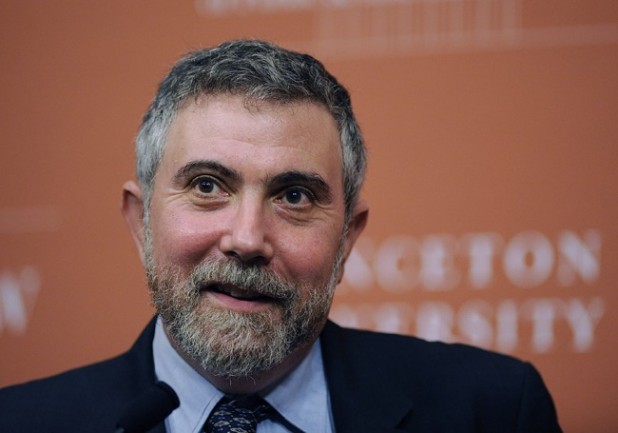Kevin MacDonald
Occidental Observer
July 22, 2015
In this 2014 interview (beginning ~6:00) Paul Krugman, commenting on the “craziness” of American politics, says (more or less verbatim): A lot of the craziness comes from cultural/ethnic issues—rural White Americans who feel they are losing their country, and they are right. They are losing their country. In the end, the power they now have will go away, but it’s a very difficult and dangerous time until then. The future is represented by Mayor Bill DeBlasio of New York, “but Ted Cruz of Texas is still out there.”
This I think sums up elite/left opinion in America (after all, Krugman writes for the New York Times) and the West generally. The bad old days are nearly behind us with people like Bill De Blasio and his mixed-race family firmly ensconced in positions of power and presiding over super-diverse New York City. They are the wave of the future. The road ahead will be manageable, although dangerous and difficult. The key to the non-crazy future as envisioned by Krugman is to lessen White power. (Another example: Joe Klein writing in Time that it is necessary to import millions of non-Whites as a cure for “our poisonous biracial era.”)
Krugman specifically mentions rural Whites, the people who for decades have been the bogeymen of Jewish political imagination in America. This quote from Terry Cooney’s book on the New York Intellectuals (a Jewish intellectual movement) sums it up:
[The New York Intellectuals associated rural America with] nativism, anti-Semitism, nationalism, and fascism as well as with anti-intellectualism and provincialism; the urban was associated antithetically with ethnic and cultural tolerance, with internationalism, and with advanced ideas. . . . The New York Intellectuals simply began with the assumption that the rural—with which they associated much of American tradition and most of the territory beyond New York—had little to contribute to a cosmopolitan culture. . . . By interpreting cultural and political issues through the urban-rural lens, writers could even mask assertions of superiority and expressions of anti-democratic sentiments as the judgments of an objective expertise.[1]
Jewish political strategizing at least since the end of World War II has always been about overcoming the power of White America, and particularly rural White America—hence the strong support and activism on behalf of non-White immigration and support for other constituencies that have different ethnic interests than Whites (e.g., Blacks, Latinos) or Whites who have been convinced not to identify with White interests (many White feminists and White LGBT, as well as the legions of Whites who personally benefit from the anti-White revolution, and of course White victims of the constant barrage of media propaganda). The process of disempowering White America, inaugurated with the 1965 immigration law, has been in place for 5 decades and is on the verge of success.
I disagree with Krugman’s analysis somewhat. It’s not just about rural White America. It’s about disempowering non-Bill DeBlasio White America, and that’s a lot more than just rural Whites. In the 2014 elections, Whites of all social classes, all age categories, and both sexes voted Republican. These voters would be a lot more likely to vote for Ted Cruz in 2016 than they would for Hilary Clinton.
It’s interesting that Ted Cruz has been pretty much the only Republican candidate who is not attacking Donald Trump for his comments on immigration and John McCain, presumably because he sees himself as appealing to the same constituency—White voters fed up with spineless politicians who prostrate themselves before the ethnic lobbies and who champion whatever views their pollsters tell them to.
Really though, the Paul Krugmans of the world have little to fear from Cruz given his strong support for expanded legal immigration (and he’s hopeless on Israel). Their longed for demographic changes will go ahead as scheduled under a Cruz administration, maybe not quite so quickly.
But unfortunately, that may well be the case with a Trump presidency as well. On July 13, Michael Cohen, “Special Counsel to Donald Trump,” claimed in an interview with CNN that “Donald Trump is a champion for legal immigrants.” Peter Brimelow notes that at a recent speech in Phoenix Trump “hinted” at support for increased legal immigration.
So in my nightmare scenario, the Republicans nominate a populist candidate who appeals to the Republican base, and he is elected. There’s huge optimism among these (overwhelmingly White) voters that we finally have a president who will “take back the country” and actually say what these voters are thinking. They finally elected someone who will destroy the scourge of political correctness. And it all happened despite an unrelenting outpouring of hostility and predictions of an imminent fascist takeover that rained down daily from the New York Times and the rest of the mainstream media.
And then President Cruz/Trump expands legal immigration with the enthusiastic support of the Republican Congress. After all, they certainly wouldn’t want to be called racists, and besides businesses benefit from cheap labor. Plus we get a war with Iran.
Paul Krugman et al., for all their sputtering about the difficult and dangerous times ahead, have nothing to fear from Cruz/Trump. Unless, of course, like Obama on Israel, this president who won as a populist actually does the right thing after saying whatever he has to to be elected. We can hope.
[1] Terry A. Cooney, The Rise of the New York Intellectuals: Partisan Review and Its Circle (Madison: University of Wisconsin Press, 1934–1945), 267-268.
 Daily Stormer The Most Censored Publication in History
Daily Stormer The Most Censored Publication in History


